Corporate Governance Compliance Analysis: Legal vs. Ethical Aspects
VerifiedAdded on 2023/03/17
|18
|4289
|71
Report
AI Summary
This report analyzes the complex relationship between legal and ethical compliance within corporate governance. It begins by defining corporate governance and its objectives, emphasizing the roles of directors, shareholders, and the importance of transparency, ethics, and effective management. The report then presents two student perspectives: one arguing for the greater impact of legal compliance, citing statutory laws and the roles of the board of directors; the other advocating for ethical compliance, highlighting its role in building trust and social responsibility. The students then debate the merits of each perspective, providing rebuttals that discuss the impact of ethics on society, the importance of ethical principles, and the role of corporate governance in aligning strategies to solve compliance with ethics. The report concludes that both legal and ethical governance are essential for the successful operation of a company. The report also discusses the benefits of good governance, including improved transparency, management, and access to capital. This assignment, completed for MAA763, provides a comprehensive overview of the topic, including the need for companies to balance profit, legal compliance, ethical behavior, and social responsibility.

1
Ethics and Governance
Name:
Course
Professor’s name
University name
City, State
Date of submission
Ethics and Governance
Name:
Course
Professor’s name
University name
City, State
Date of submission
Paraphrase This Document
Need a fresh take? Get an instant paraphrase of this document with our AI Paraphraser
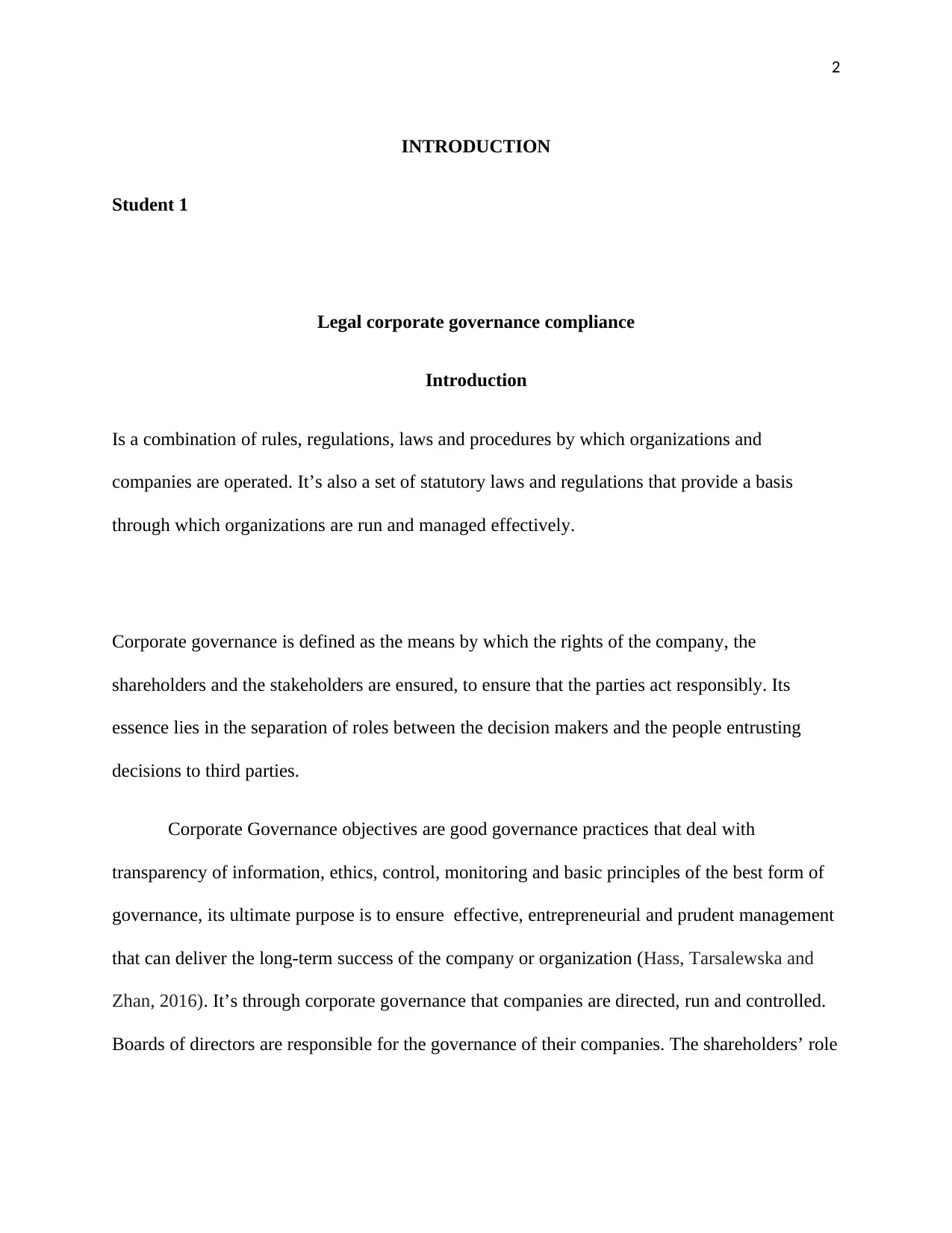
2
INTRODUCTION
Student 1
Legal corporate governance compliance
Introduction
Is a combination of rules, regulations, laws and procedures by which organizations and
companies are operated. It’s also a set of statutory laws and regulations that provide a basis
through which organizations are run and managed effectively.
Corporate governance is defined as the means by which the rights of the company, the
shareholders and the stakeholders are ensured, to ensure that the parties act responsibly. Its
essence lies in the separation of roles between the decision makers and the people entrusting
decisions to third parties.
Corporate Governance objectives are good governance practices that deal with
transparency of information, ethics, control, monitoring and basic principles of the best form of
governance, its ultimate purpose is to ensure effective, entrepreneurial and prudent management
that can deliver the long-term success of the company or organization (Hass, Tarsalewska and
Zhan, 2016). It’s through corporate governance that companies are directed, run and controlled.
Boards of directors are responsible for the governance of their companies. The shareholders’ role
INTRODUCTION
Student 1
Legal corporate governance compliance
Introduction
Is a combination of rules, regulations, laws and procedures by which organizations and
companies are operated. It’s also a set of statutory laws and regulations that provide a basis
through which organizations are run and managed effectively.
Corporate governance is defined as the means by which the rights of the company, the
shareholders and the stakeholders are ensured, to ensure that the parties act responsibly. Its
essence lies in the separation of roles between the decision makers and the people entrusting
decisions to third parties.
Corporate Governance objectives are good governance practices that deal with
transparency of information, ethics, control, monitoring and basic principles of the best form of
governance, its ultimate purpose is to ensure effective, entrepreneurial and prudent management
that can deliver the long-term success of the company or organization (Hass, Tarsalewska and
Zhan, 2016). It’s through corporate governance that companies are directed, run and controlled.
Boards of directors are responsible for the governance of their companies. The shareholders’ role
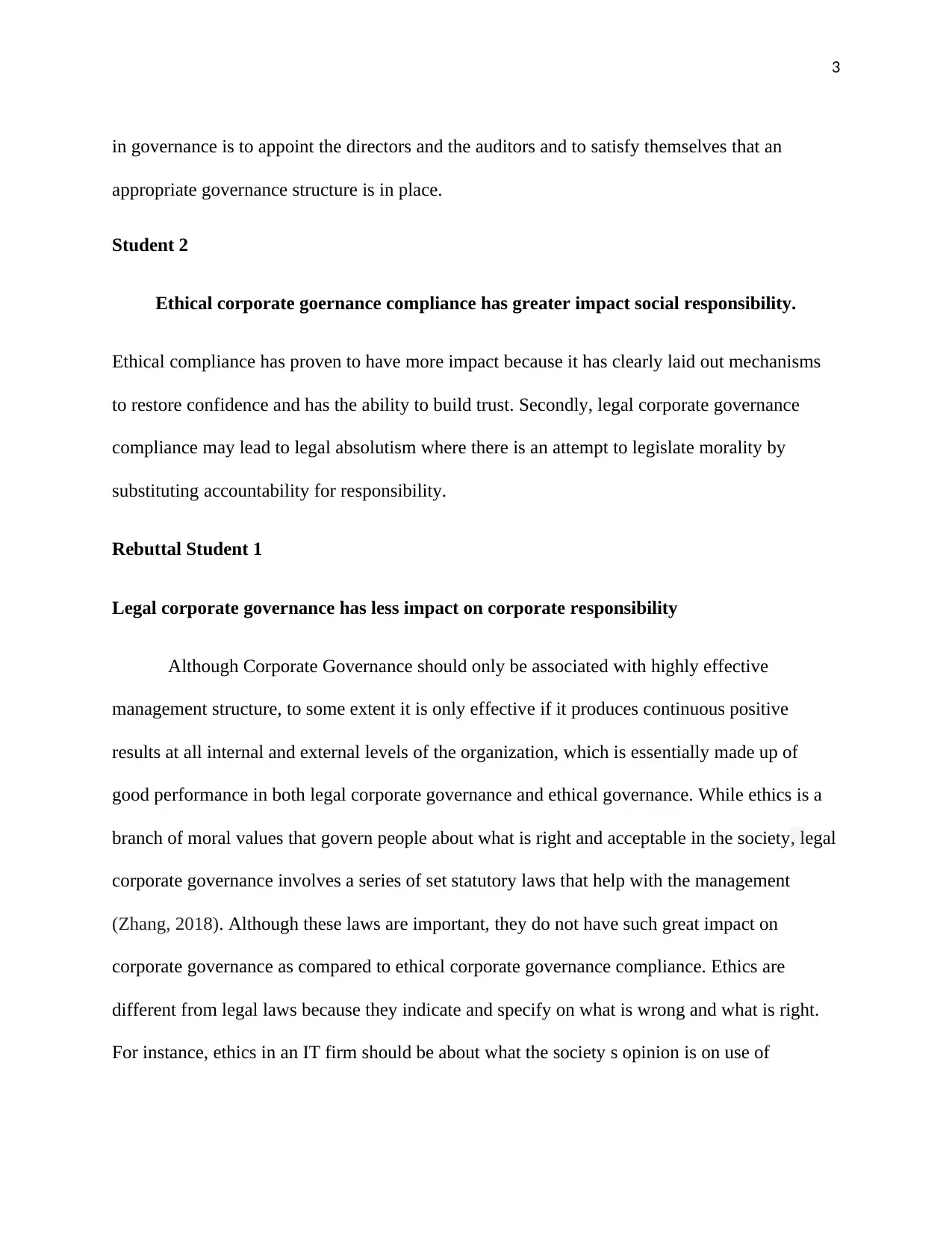
3
in governance is to appoint the directors and the auditors and to satisfy themselves that an
appropriate governance structure is in place.
Student 2
Ethical corporate goernance compliance has greater impact social responsibility.
Ethical compliance has proven to have more impact because it has clearly laid out mechanisms
to restore confidence and has the ability to build trust. Secondly, legal corporate governance
compliance may lead to legal absolutism where there is an attempt to legislate morality by
substituting accountability for responsibility.
Rebuttal Student 1
Legal corporate governance has less impact on corporate responsibility
Although Corporate Governance should only be associated with highly effective
management structure, to some extent it is only effective if it produces continuous positive
results at all internal and external levels of the organization, which is essentially made up of
good performance in both legal corporate governance and ethical governance. While ethics is a
branch of moral values that govern people about what is right and acceptable in the society, legal
corporate governance involves a series of set statutory laws that help with the management
(Zhang, 2018). Although these laws are important, they do not have such great impact on
corporate governance as compared to ethical corporate governance compliance. Ethics are
different from legal laws because they indicate and specify on what is wrong and what is right.
For instance, ethics in an IT firm should be about what the society s opinion is on use of
in governance is to appoint the directors and the auditors and to satisfy themselves that an
appropriate governance structure is in place.
Student 2
Ethical corporate goernance compliance has greater impact social responsibility.
Ethical compliance has proven to have more impact because it has clearly laid out mechanisms
to restore confidence and has the ability to build trust. Secondly, legal corporate governance
compliance may lead to legal absolutism where there is an attempt to legislate morality by
substituting accountability for responsibility.
Rebuttal Student 1
Legal corporate governance has less impact on corporate responsibility
Although Corporate Governance should only be associated with highly effective
management structure, to some extent it is only effective if it produces continuous positive
results at all internal and external levels of the organization, which is essentially made up of
good performance in both legal corporate governance and ethical governance. While ethics is a
branch of moral values that govern people about what is right and acceptable in the society, legal
corporate governance involves a series of set statutory laws that help with the management
(Zhang, 2018). Although these laws are important, they do not have such great impact on
corporate governance as compared to ethical corporate governance compliance. Ethics are
different from legal laws because they indicate and specify on what is wrong and what is right.
For instance, ethics in an IT firm should be about what the society s opinion is on use of
⊘ This is a preview!⊘
Do you want full access?
Subscribe today to unlock all pages.

Trusted by 1+ million students worldwide
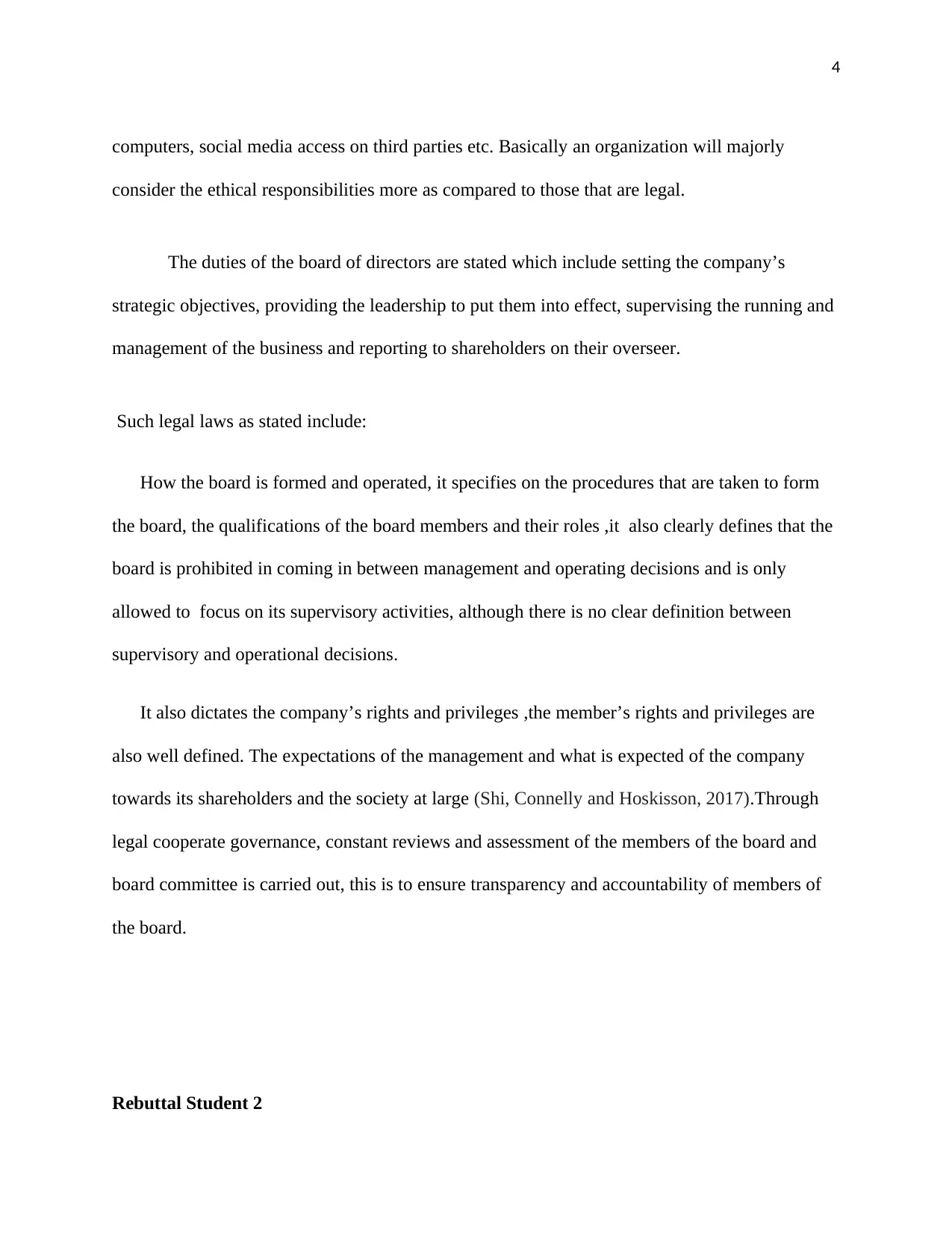
4
computers, social media access on third parties etc. Basically an organization will majorly
consider the ethical responsibilities more as compared to those that are legal.
The duties of the board of directors are stated which include setting the company’s
strategic objectives, providing the leadership to put them into effect, supervising the running and
management of the business and reporting to shareholders on their overseer.
Such legal laws as stated include:
How the board is formed and operated, it specifies on the procedures that are taken to form
the board, the qualifications of the board members and their roles ,it also clearly defines that the
board is prohibited in coming in between management and operating decisions and is only
allowed to focus on its supervisory activities, although there is no clear definition between
supervisory and operational decisions.
It also dictates the company’s rights and privileges ,the member’s rights and privileges are
also well defined. The expectations of the management and what is expected of the company
towards its shareholders and the society at large (Shi, Connelly and Hoskisson, 2017).Through
legal cooperate governance, constant reviews and assessment of the members of the board and
board committee is carried out, this is to ensure transparency and accountability of members of
the board.
Rebuttal Student 2
computers, social media access on third parties etc. Basically an organization will majorly
consider the ethical responsibilities more as compared to those that are legal.
The duties of the board of directors are stated which include setting the company’s
strategic objectives, providing the leadership to put them into effect, supervising the running and
management of the business and reporting to shareholders on their overseer.
Such legal laws as stated include:
How the board is formed and operated, it specifies on the procedures that are taken to form
the board, the qualifications of the board members and their roles ,it also clearly defines that the
board is prohibited in coming in between management and operating decisions and is only
allowed to focus on its supervisory activities, although there is no clear definition between
supervisory and operational decisions.
It also dictates the company’s rights and privileges ,the member’s rights and privileges are
also well defined. The expectations of the management and what is expected of the company
towards its shareholders and the society at large (Shi, Connelly and Hoskisson, 2017).Through
legal cooperate governance, constant reviews and assessment of the members of the board and
board committee is carried out, this is to ensure transparency and accountability of members of
the board.
Rebuttal Student 2
Paraphrase This Document
Need a fresh take? Get an instant paraphrase of this document with our AI Paraphraser
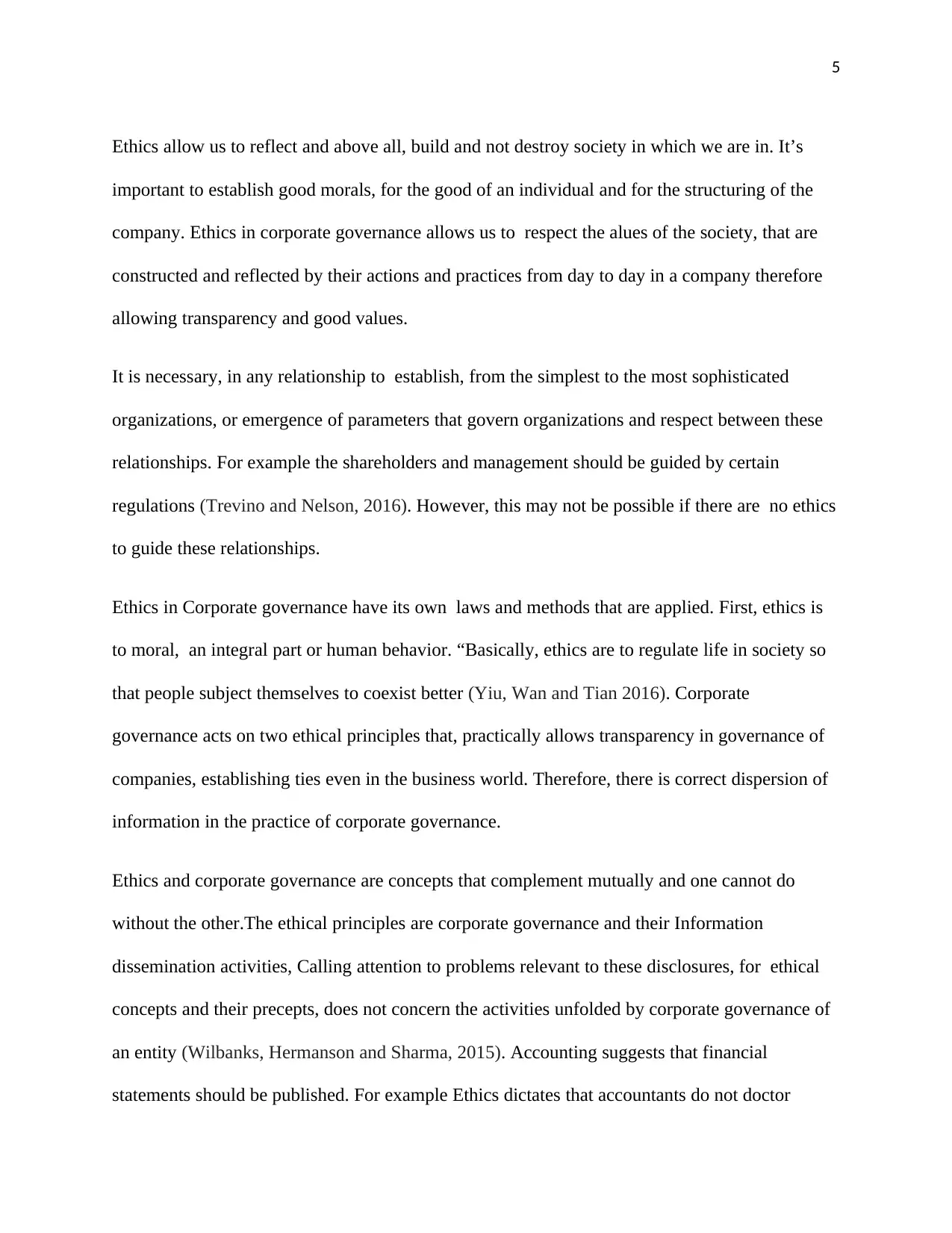
5
Ethics allow us to reflect and above all, build and not destroy society in which we are in. It’s
important to establish good morals, for the good of an individual and for the structuring of the
company. Ethics in corporate governance allows us to respect the alues of the society, that are
constructed and reflected by their actions and practices from day to day in a company therefore
allowing transparency and good values.
It is necessary, in any relationship to establish, from the simplest to the most sophisticated
organizations, or emergence of parameters that govern organizations and respect between these
relationships. For example the shareholders and management should be guided by certain
regulations (Trevino and Nelson, 2016). However, this may not be possible if there are no ethics
to guide these relationships.
Ethics in Corporate governance have its own laws and methods that are applied. First, ethics is
to moral, an integral part or human behavior. “Basically, ethics are to regulate life in society so
that people subject themselves to coexist better (Yiu, Wan and Tian 2016). Corporate
governance acts on two ethical principles that, practically allows transparency in governance of
companies, establishing ties even in the business world. Therefore, there is correct dispersion of
information in the practice of corporate governance.
Ethics and corporate governance are concepts that complement mutually and one cannot do
without the other.The ethical principles are corporate governance and their Information
dissemination activities, Calling attention to problems relevant to these disclosures, for ethical
concepts and their precepts, does not concern the activities unfolded by corporate governance of
an entity (Wilbanks, Hermanson and Sharma, 2015). Accounting suggests that financial
statements should be published. For example Ethics dictates that accountants do not doctor
Ethics allow us to reflect and above all, build and not destroy society in which we are in. It’s
important to establish good morals, for the good of an individual and for the structuring of the
company. Ethics in corporate governance allows us to respect the alues of the society, that are
constructed and reflected by their actions and practices from day to day in a company therefore
allowing transparency and good values.
It is necessary, in any relationship to establish, from the simplest to the most sophisticated
organizations, or emergence of parameters that govern organizations and respect between these
relationships. For example the shareholders and management should be guided by certain
regulations (Trevino and Nelson, 2016). However, this may not be possible if there are no ethics
to guide these relationships.
Ethics in Corporate governance have its own laws and methods that are applied. First, ethics is
to moral, an integral part or human behavior. “Basically, ethics are to regulate life in society so
that people subject themselves to coexist better (Yiu, Wan and Tian 2016). Corporate
governance acts on two ethical principles that, practically allows transparency in governance of
companies, establishing ties even in the business world. Therefore, there is correct dispersion of
information in the practice of corporate governance.
Ethics and corporate governance are concepts that complement mutually and one cannot do
without the other.The ethical principles are corporate governance and their Information
dissemination activities, Calling attention to problems relevant to these disclosures, for ethical
concepts and their precepts, does not concern the activities unfolded by corporate governance of
an entity (Wilbanks, Hermanson and Sharma, 2015). Accounting suggests that financial
statements should be published. For example Ethics dictates that accountants do not doctor
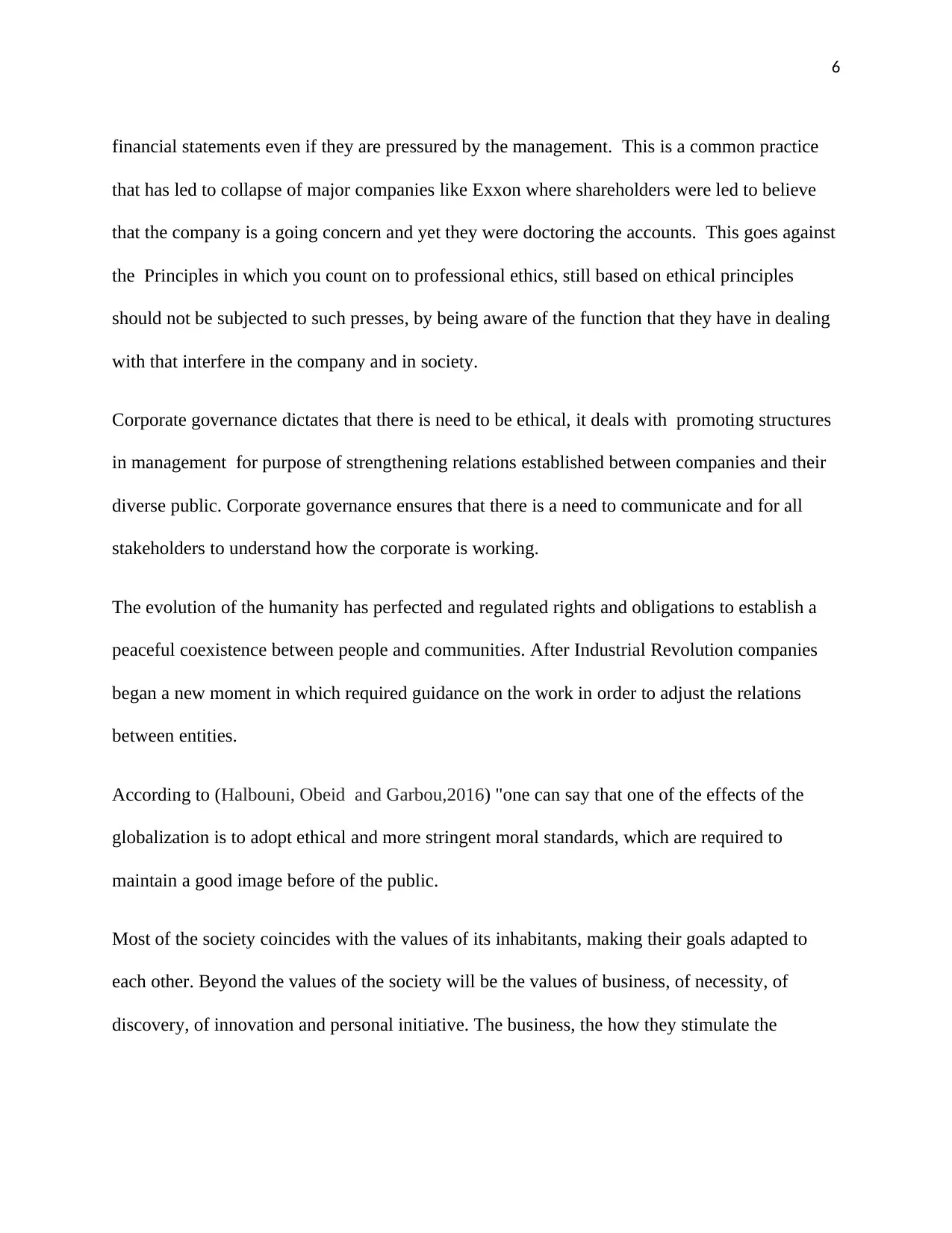
6
financial statements even if they are pressured by the management. This is a common practice
that has led to collapse of major companies like Exxon where shareholders were led to believe
that the company is a going concern and yet they were doctoring the accounts. This goes against
the Principles in which you count on to professional ethics, still based on ethical principles
should not be subjected to such presses, by being aware of the function that they have in dealing
with that interfere in the company and in society.
Corporate governance dictates that there is need to be ethical, it deals with promoting structures
in management for purpose of strengthening relations established between companies and their
diverse public. Corporate governance ensures that there is a need to communicate and for all
stakeholders to understand how the corporate is working.
The evolution of the humanity has perfected and regulated rights and obligations to establish a
peaceful coexistence between people and communities. After Industrial Revolution companies
began a new moment in which required guidance on the work in order to adjust the relations
between entities.
According to (Halbouni, Obeid and Garbou,2016) "one can say that one of the effects of the
globalization is to adopt ethical and more stringent moral standards, which are required to
maintain a good image before of the public.
Most of the society coincides with the values of its inhabitants, making their goals adapted to
each other. Beyond the values of the society will be the values of business, of necessity, of
discovery, of innovation and personal initiative. The business, the how they stimulate the
financial statements even if they are pressured by the management. This is a common practice
that has led to collapse of major companies like Exxon where shareholders were led to believe
that the company is a going concern and yet they were doctoring the accounts. This goes against
the Principles in which you count on to professional ethics, still based on ethical principles
should not be subjected to such presses, by being aware of the function that they have in dealing
with that interfere in the company and in society.
Corporate governance dictates that there is need to be ethical, it deals with promoting structures
in management for purpose of strengthening relations established between companies and their
diverse public. Corporate governance ensures that there is a need to communicate and for all
stakeholders to understand how the corporate is working.
The evolution of the humanity has perfected and regulated rights and obligations to establish a
peaceful coexistence between people and communities. After Industrial Revolution companies
began a new moment in which required guidance on the work in order to adjust the relations
between entities.
According to (Halbouni, Obeid and Garbou,2016) "one can say that one of the effects of the
globalization is to adopt ethical and more stringent moral standards, which are required to
maintain a good image before of the public.
Most of the society coincides with the values of its inhabitants, making their goals adapted to
each other. Beyond the values of the society will be the values of business, of necessity, of
discovery, of innovation and personal initiative. The business, the how they stimulate the
⊘ This is a preview!⊘
Do you want full access?
Subscribe today to unlock all pages.

Trusted by 1+ million students worldwide
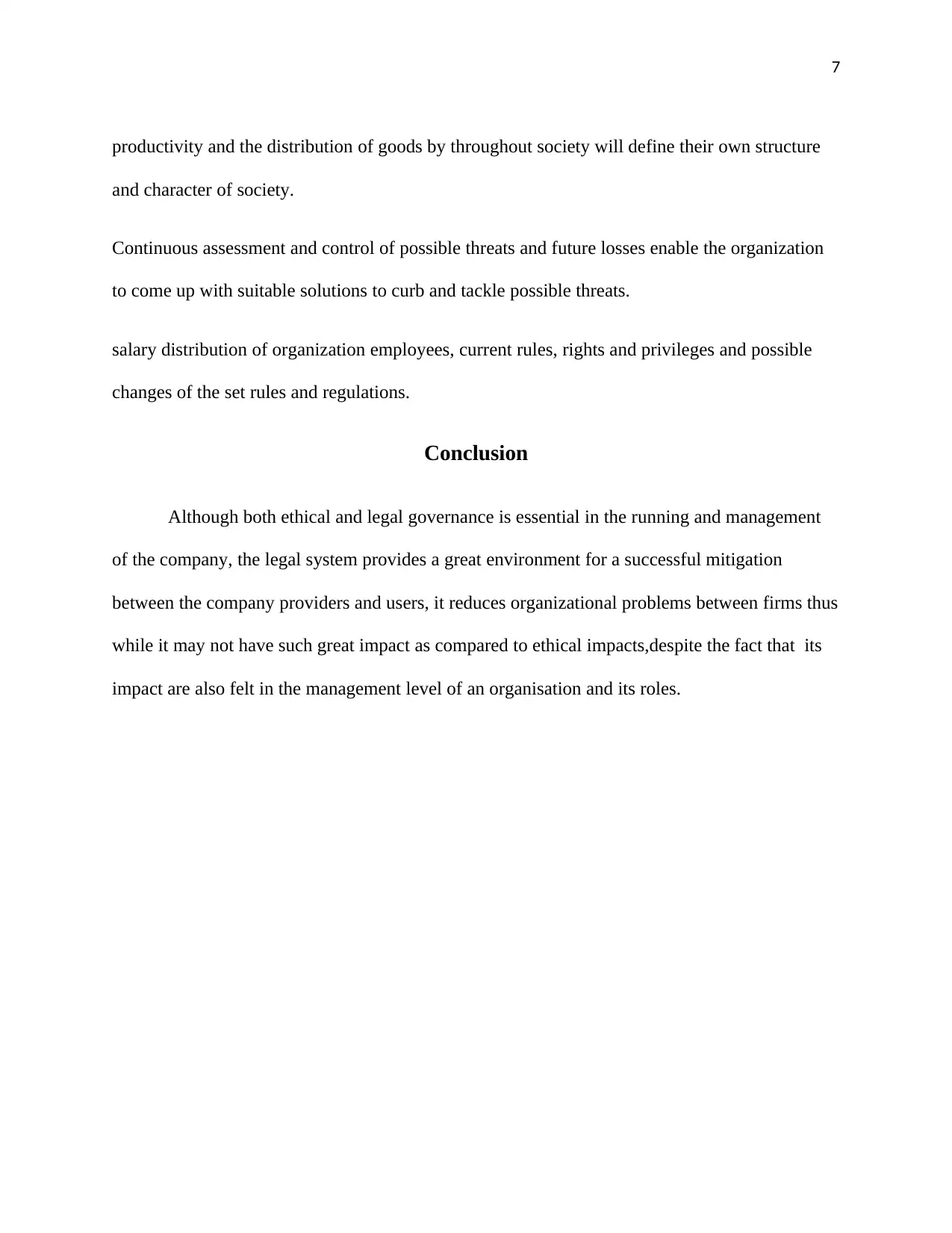
7
productivity and the distribution of goods by throughout society will define their own structure
and character of society.
Continuous assessment and control of possible threats and future losses enable the organization
to come up with suitable solutions to curb and tackle possible threats.
salary distribution of organization employees, current rules, rights and privileges and possible
changes of the set rules and regulations.
Conclusion
Although both ethical and legal governance is essential in the running and management
of the company, the legal system provides a great environment for a successful mitigation
between the company providers and users, it reduces organizational problems between firms thus
while it may not have such great impact as compared to ethical impacts,despite the fact that its
impact are also felt in the management level of an organisation and its roles.
productivity and the distribution of goods by throughout society will define their own structure
and character of society.
Continuous assessment and control of possible threats and future losses enable the organization
to come up with suitable solutions to curb and tackle possible threats.
salary distribution of organization employees, current rules, rights and privileges and possible
changes of the set rules and regulations.
Conclusion
Although both ethical and legal governance is essential in the running and management
of the company, the legal system provides a great environment for a successful mitigation
between the company providers and users, it reduces organizational problems between firms thus
while it may not have such great impact as compared to ethical impacts,despite the fact that its
impact are also felt in the management level of an organisation and its roles.
Paraphrase This Document
Need a fresh take? Get an instant paraphrase of this document with our AI Paraphraser
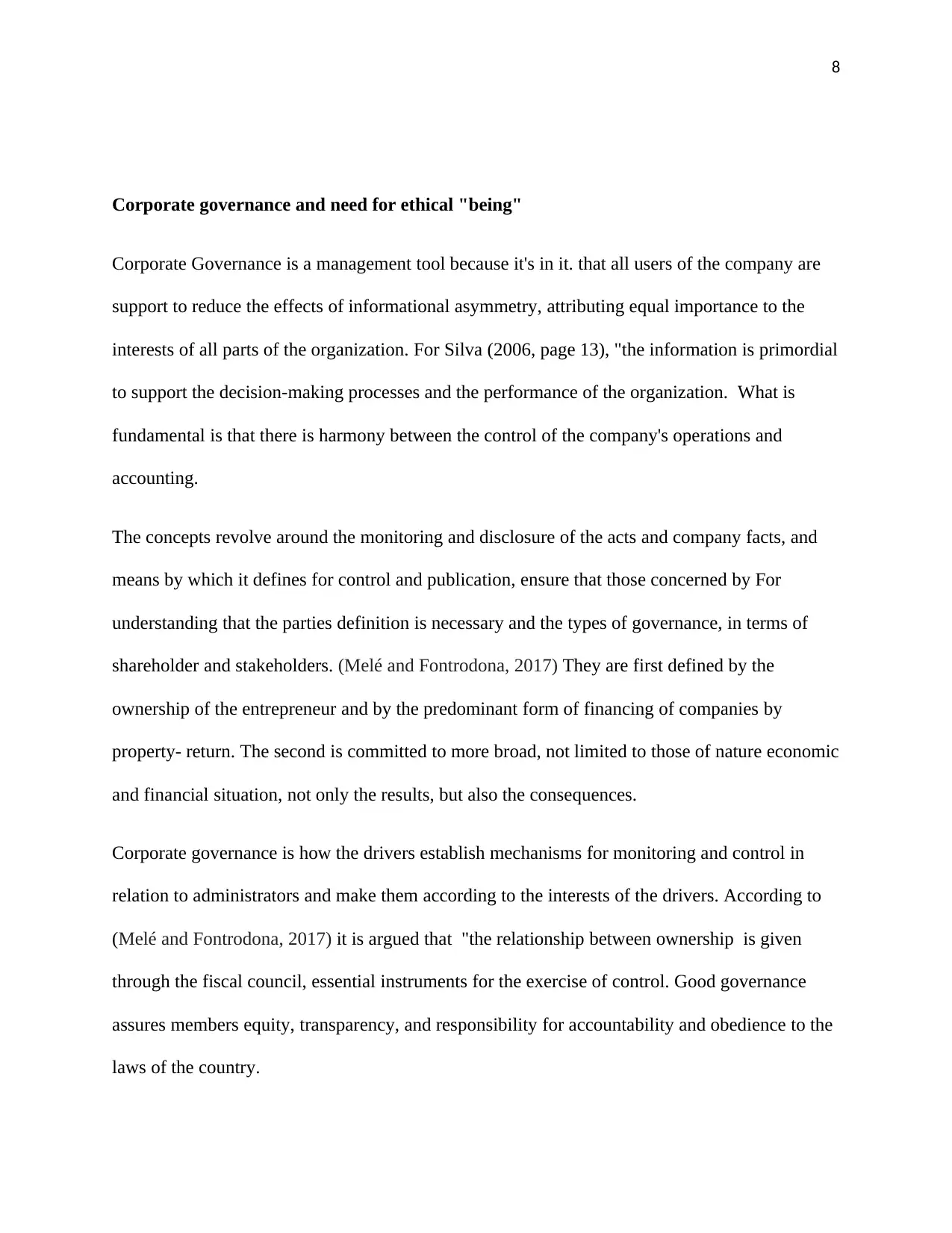
8
Corporate governance and need for ethical "being"
Corporate Governance is a management tool because it's in it. that all users of the company are
support to reduce the effects of informational asymmetry, attributing equal importance to the
interests of all parts of the organization. For Silva (2006, page 13), "the information is primordial
to support the decision-making processes and the performance of the organization. What is
fundamental is that there is harmony between the control of the company's operations and
accounting.
The concepts revolve around the monitoring and disclosure of the acts and company facts, and
means by which it defines for control and publication, ensure that those concerned by For
understanding that the parties definition is necessary and the types of governance, in terms of
shareholder and stakeholders. (Melé and Fontrodona, 2017) They are first defined by the
ownership of the entrepreneur and by the predominant form of financing of companies by
property- return. The second is committed to more broad, not limited to those of nature economic
and financial situation, not only the results, but also the consequences.
Corporate governance is how the drivers establish mechanisms for monitoring and control in
relation to administrators and make them according to the interests of the drivers. According to
(Melé and Fontrodona, 2017) it is argued that "the relationship between ownership is given
through the fiscal council, essential instruments for the exercise of control. Good governance
assures members equity, transparency, and responsibility for accountability and obedience to the
laws of the country.
Corporate governance and need for ethical "being"
Corporate Governance is a management tool because it's in it. that all users of the company are
support to reduce the effects of informational asymmetry, attributing equal importance to the
interests of all parts of the organization. For Silva (2006, page 13), "the information is primordial
to support the decision-making processes and the performance of the organization. What is
fundamental is that there is harmony between the control of the company's operations and
accounting.
The concepts revolve around the monitoring and disclosure of the acts and company facts, and
means by which it defines for control and publication, ensure that those concerned by For
understanding that the parties definition is necessary and the types of governance, in terms of
shareholder and stakeholders. (Melé and Fontrodona, 2017) They are first defined by the
ownership of the entrepreneur and by the predominant form of financing of companies by
property- return. The second is committed to more broad, not limited to those of nature economic
and financial situation, not only the results, but also the consequences.
Corporate governance is how the drivers establish mechanisms for monitoring and control in
relation to administrators and make them according to the interests of the drivers. According to
(Melé and Fontrodona, 2017) it is argued that "the relationship between ownership is given
through the fiscal council, essential instruments for the exercise of control. Good governance
assures members equity, transparency, and responsibility for accountability and obedience to the
laws of the country.
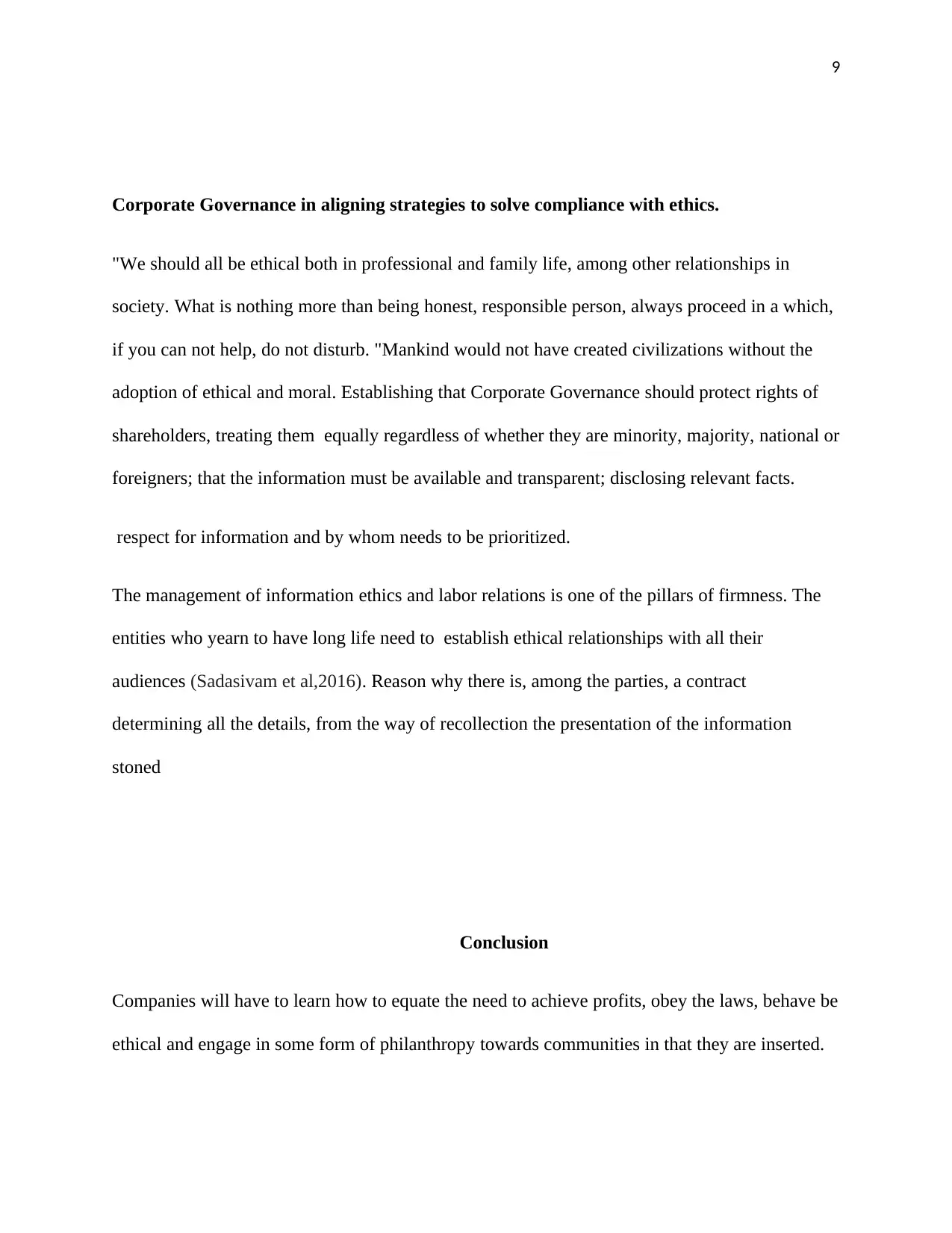
9
Corporate Governance in aligning strategies to solve compliance with ethics.
"We should all be ethical both in professional and family life, among other relationships in
society. What is nothing more than being honest, responsible person, always proceed in a which,
if you can not help, do not disturb. "Mankind would not have created civilizations without the
adoption of ethical and moral. Establishing that Corporate Governance should protect rights of
shareholders, treating them equally regardless of whether they are minority, majority, national or
foreigners; that the information must be available and transparent; disclosing relevant facts.
respect for information and by whom needs to be prioritized.
The management of information ethics and labor relations is one of the pillars of firmness. The
entities who yearn to have long life need to establish ethical relationships with all their
audiences (Sadasivam et al,2016). Reason why there is, among the parties, a contract
determining all the details, from the way of recollection the presentation of the information
stoned
Conclusion
Companies will have to learn how to equate the need to achieve profits, obey the laws, behave be
ethical and engage in some form of philanthropy towards communities in that they are inserted.
Corporate Governance in aligning strategies to solve compliance with ethics.
"We should all be ethical both in professional and family life, among other relationships in
society. What is nothing more than being honest, responsible person, always proceed in a which,
if you can not help, do not disturb. "Mankind would not have created civilizations without the
adoption of ethical and moral. Establishing that Corporate Governance should protect rights of
shareholders, treating them equally regardless of whether they are minority, majority, national or
foreigners; that the information must be available and transparent; disclosing relevant facts.
respect for information and by whom needs to be prioritized.
The management of information ethics and labor relations is one of the pillars of firmness. The
entities who yearn to have long life need to establish ethical relationships with all their
audiences (Sadasivam et al,2016). Reason why there is, among the parties, a contract
determining all the details, from the way of recollection the presentation of the information
stoned
Conclusion
Companies will have to learn how to equate the need to achieve profits, obey the laws, behave be
ethical and engage in some form of philanthropy towards communities in that they are inserted.
⊘ This is a preview!⊘
Do you want full access?
Subscribe today to unlock all pages.

Trusted by 1+ million students worldwide
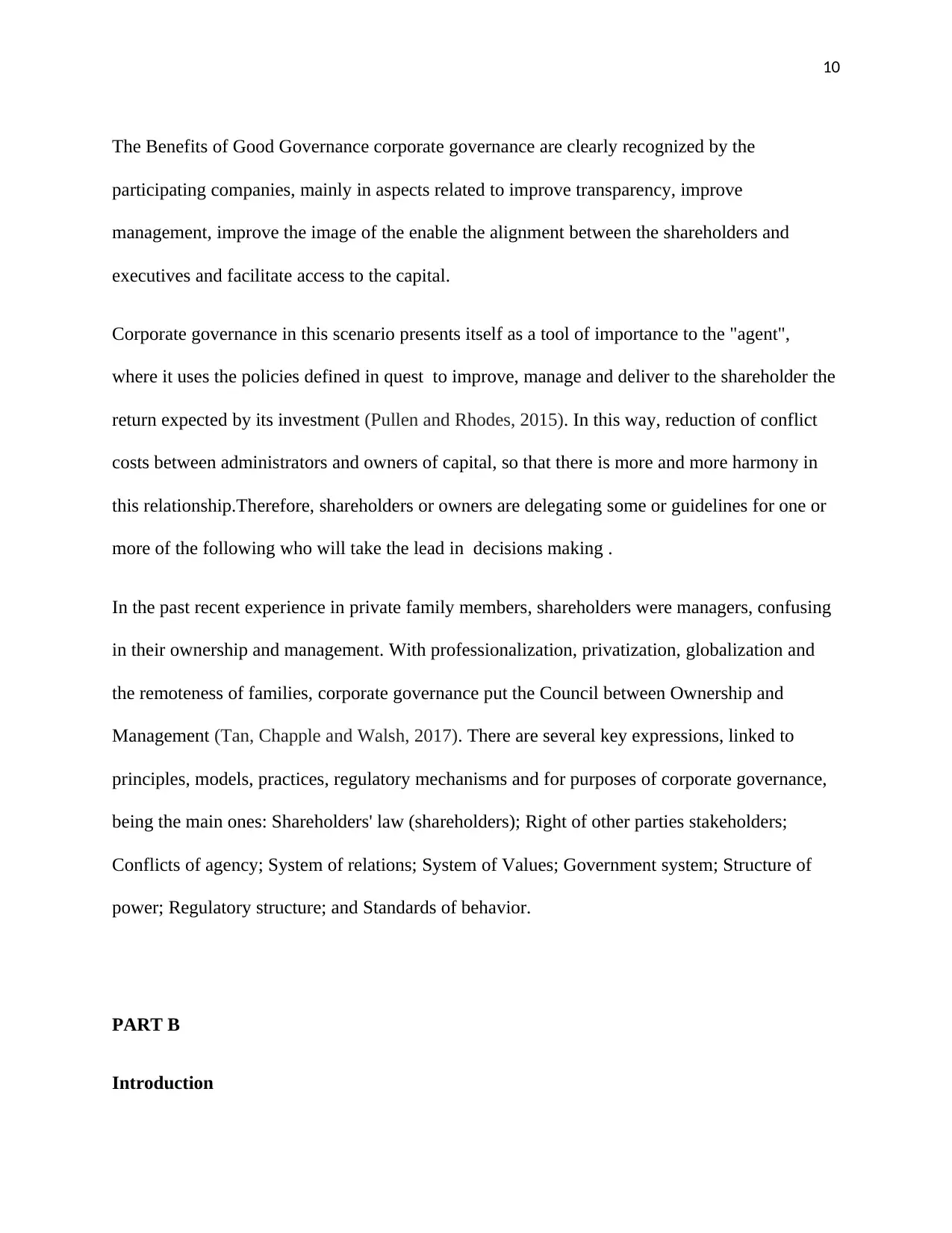
10
The Benefits of Good Governance corporate governance are clearly recognized by the
participating companies, mainly in aspects related to improve transparency, improve
management, improve the image of the enable the alignment between the shareholders and
executives and facilitate access to the capital.
Corporate governance in this scenario presents itself as a tool of importance to the "agent",
where it uses the policies defined in quest to improve, manage and deliver to the shareholder the
return expected by its investment (Pullen and Rhodes, 2015). In this way, reduction of conflict
costs between administrators and owners of capital, so that there is more and more harmony in
this relationship.Therefore, shareholders or owners are delegating some or guidelines for one or
more of the following who will take the lead in decisions making .
In the past recent experience in private family members, shareholders were managers, confusing
in their ownership and management. With professionalization, privatization, globalization and
the remoteness of families, corporate governance put the Council between Ownership and
Management (Tan, Chapple and Walsh, 2017). There are several key expressions, linked to
principles, models, practices, regulatory mechanisms and for purposes of corporate governance,
being the main ones: Shareholders' law (shareholders); Right of other parties stakeholders;
Conflicts of agency; System of relations; System of Values; Government system; Structure of
power; Regulatory structure; and Standards of behavior.
PART B
Introduction
The Benefits of Good Governance corporate governance are clearly recognized by the
participating companies, mainly in aspects related to improve transparency, improve
management, improve the image of the enable the alignment between the shareholders and
executives and facilitate access to the capital.
Corporate governance in this scenario presents itself as a tool of importance to the "agent",
where it uses the policies defined in quest to improve, manage and deliver to the shareholder the
return expected by its investment (Pullen and Rhodes, 2015). In this way, reduction of conflict
costs between administrators and owners of capital, so that there is more and more harmony in
this relationship.Therefore, shareholders or owners are delegating some or guidelines for one or
more of the following who will take the lead in decisions making .
In the past recent experience in private family members, shareholders were managers, confusing
in their ownership and management. With professionalization, privatization, globalization and
the remoteness of families, corporate governance put the Council between Ownership and
Management (Tan, Chapple and Walsh, 2017). There are several key expressions, linked to
principles, models, practices, regulatory mechanisms and for purposes of corporate governance,
being the main ones: Shareholders' law (shareholders); Right of other parties stakeholders;
Conflicts of agency; System of relations; System of Values; Government system; Structure of
power; Regulatory structure; and Standards of behavior.
PART B
Introduction
Paraphrase This Document
Need a fresh take? Get an instant paraphrase of this document with our AI Paraphraser
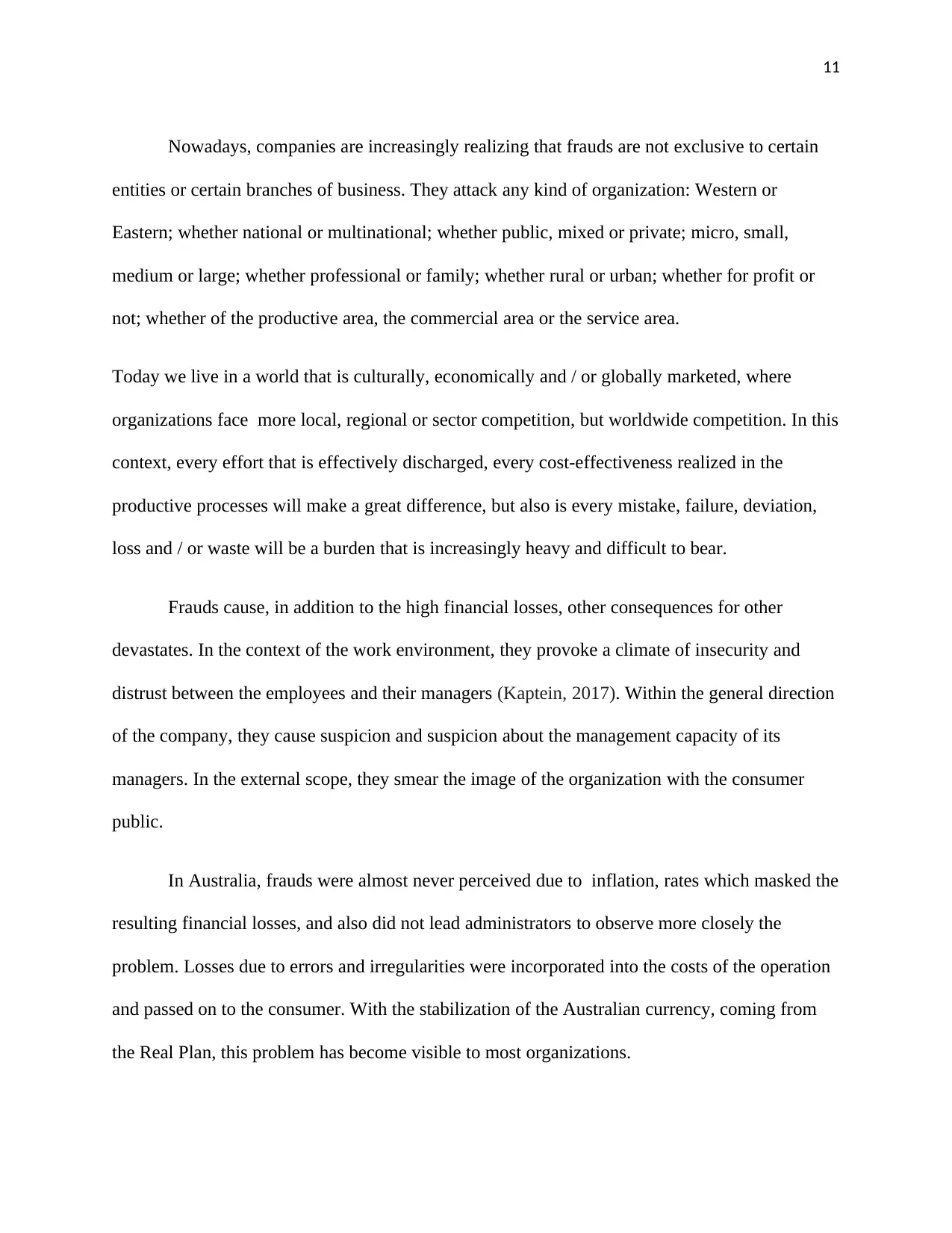
11
Nowadays, companies are increasingly realizing that frauds are not exclusive to certain
entities or certain branches of business. They attack any kind of organization: Western or
Eastern; whether national or multinational; whether public, mixed or private; micro, small,
medium or large; whether professional or family; whether rural or urban; whether for profit or
not; whether of the productive area, the commercial area or the service area.
Today we live in a world that is culturally, economically and / or globally marketed, where
organizations face more local, regional or sector competition, but worldwide competition. In this
context, every effort that is effectively discharged, every cost-effectiveness realized in the
productive processes will make a great difference, but also is every mistake, failure, deviation,
loss and / or waste will be a burden that is increasingly heavy and difficult to bear.
Frauds cause, in addition to the high financial losses, other consequences for other
devastates. In the context of the work environment, they provoke a climate of insecurity and
distrust between the employees and their managers (Kaptein, 2017). Within the general direction
of the company, they cause suspicion and suspicion about the management capacity of its
managers. In the external scope, they smear the image of the organization with the consumer
public.
In Australia, frauds were almost never perceived due to inflation, rates which masked the
resulting financial losses, and also did not lead administrators to observe more closely the
problem. Losses due to errors and irregularities were incorporated into the costs of the operation
and passed on to the consumer. With the stabilization of the Australian currency, coming from
the Real Plan, this problem has become visible to most organizations.
Nowadays, companies are increasingly realizing that frauds are not exclusive to certain
entities or certain branches of business. They attack any kind of organization: Western or
Eastern; whether national or multinational; whether public, mixed or private; micro, small,
medium or large; whether professional or family; whether rural or urban; whether for profit or
not; whether of the productive area, the commercial area or the service area.
Today we live in a world that is culturally, economically and / or globally marketed, where
organizations face more local, regional or sector competition, but worldwide competition. In this
context, every effort that is effectively discharged, every cost-effectiveness realized in the
productive processes will make a great difference, but also is every mistake, failure, deviation,
loss and / or waste will be a burden that is increasingly heavy and difficult to bear.
Frauds cause, in addition to the high financial losses, other consequences for other
devastates. In the context of the work environment, they provoke a climate of insecurity and
distrust between the employees and their managers (Kaptein, 2017). Within the general direction
of the company, they cause suspicion and suspicion about the management capacity of its
managers. In the external scope, they smear the image of the organization with the consumer
public.
In Australia, frauds were almost never perceived due to inflation, rates which masked the
resulting financial losses, and also did not lead administrators to observe more closely the
problem. Losses due to errors and irregularities were incorporated into the costs of the operation
and passed on to the consumer. With the stabilization of the Australian currency, coming from
the Real Plan, this problem has become visible to most organizations.
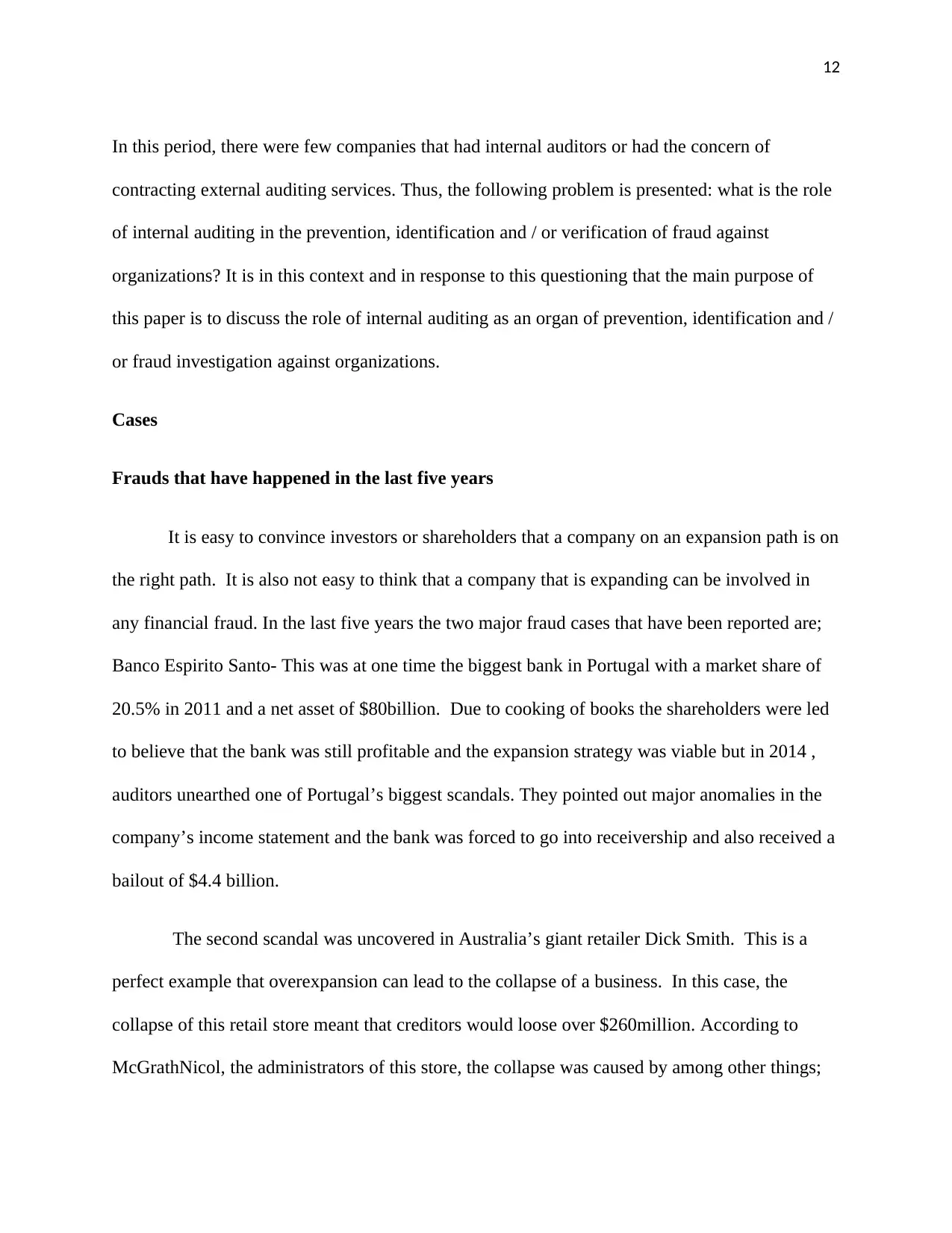
12
In this period, there were few companies that had internal auditors or had the concern of
contracting external auditing services. Thus, the following problem is presented: what is the role
of internal auditing in the prevention, identification and / or verification of fraud against
organizations? It is in this context and in response to this questioning that the main purpose of
this paper is to discuss the role of internal auditing as an organ of prevention, identification and /
or fraud investigation against organizations.
Cases
Frauds that have happened in the last five years
It is easy to convince investors or shareholders that a company on an expansion path is on
the right path. It is also not easy to think that a company that is expanding can be involved in
any financial fraud. In the last five years the two major fraud cases that have been reported are;
Banco Espirito Santo- This was at one time the biggest bank in Portugal with a market share of
20.5% in 2011 and a net asset of $80billion. Due to cooking of books the shareholders were led
to believe that the bank was still profitable and the expansion strategy was viable but in 2014 ,
auditors unearthed one of Portugal’s biggest scandals. They pointed out major anomalies in the
company’s income statement and the bank was forced to go into receivership and also received a
bailout of $4.4 billion.
The second scandal was uncovered in Australia’s giant retailer Dick Smith. This is a
perfect example that overexpansion can lead to the collapse of a business. In this case, the
collapse of this retail store meant that creditors would loose over $260million. According to
McGrathNicol, the administrators of this store, the collapse was caused by among other things;
In this period, there were few companies that had internal auditors or had the concern of
contracting external auditing services. Thus, the following problem is presented: what is the role
of internal auditing in the prevention, identification and / or verification of fraud against
organizations? It is in this context and in response to this questioning that the main purpose of
this paper is to discuss the role of internal auditing as an organ of prevention, identification and /
or fraud investigation against organizations.
Cases
Frauds that have happened in the last five years
It is easy to convince investors or shareholders that a company on an expansion path is on
the right path. It is also not easy to think that a company that is expanding can be involved in
any financial fraud. In the last five years the two major fraud cases that have been reported are;
Banco Espirito Santo- This was at one time the biggest bank in Portugal with a market share of
20.5% in 2011 and a net asset of $80billion. Due to cooking of books the shareholders were led
to believe that the bank was still profitable and the expansion strategy was viable but in 2014 ,
auditors unearthed one of Portugal’s biggest scandals. They pointed out major anomalies in the
company’s income statement and the bank was forced to go into receivership and also received a
bailout of $4.4 billion.
The second scandal was uncovered in Australia’s giant retailer Dick Smith. This is a
perfect example that overexpansion can lead to the collapse of a business. In this case, the
collapse of this retail store meant that creditors would loose over $260million. According to
McGrathNicol, the administrators of this store, the collapse was caused by among other things;
⊘ This is a preview!⊘
Do you want full access?
Subscribe today to unlock all pages.

Trusted by 1+ million students worldwide
1 out of 18
Related Documents
Your All-in-One AI-Powered Toolkit for Academic Success.
+13062052269
info@desklib.com
Available 24*7 on WhatsApp / Email
![[object Object]](/_next/static/media/star-bottom.7253800d.svg)
Unlock your academic potential
Copyright © 2020–2025 A2Z Services. All Rights Reserved. Developed and managed by ZUCOL.





